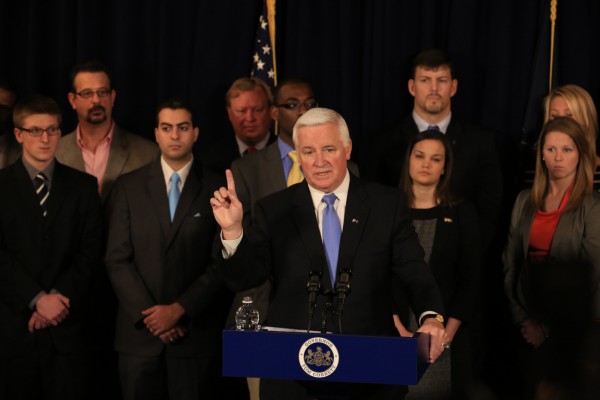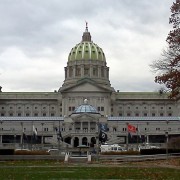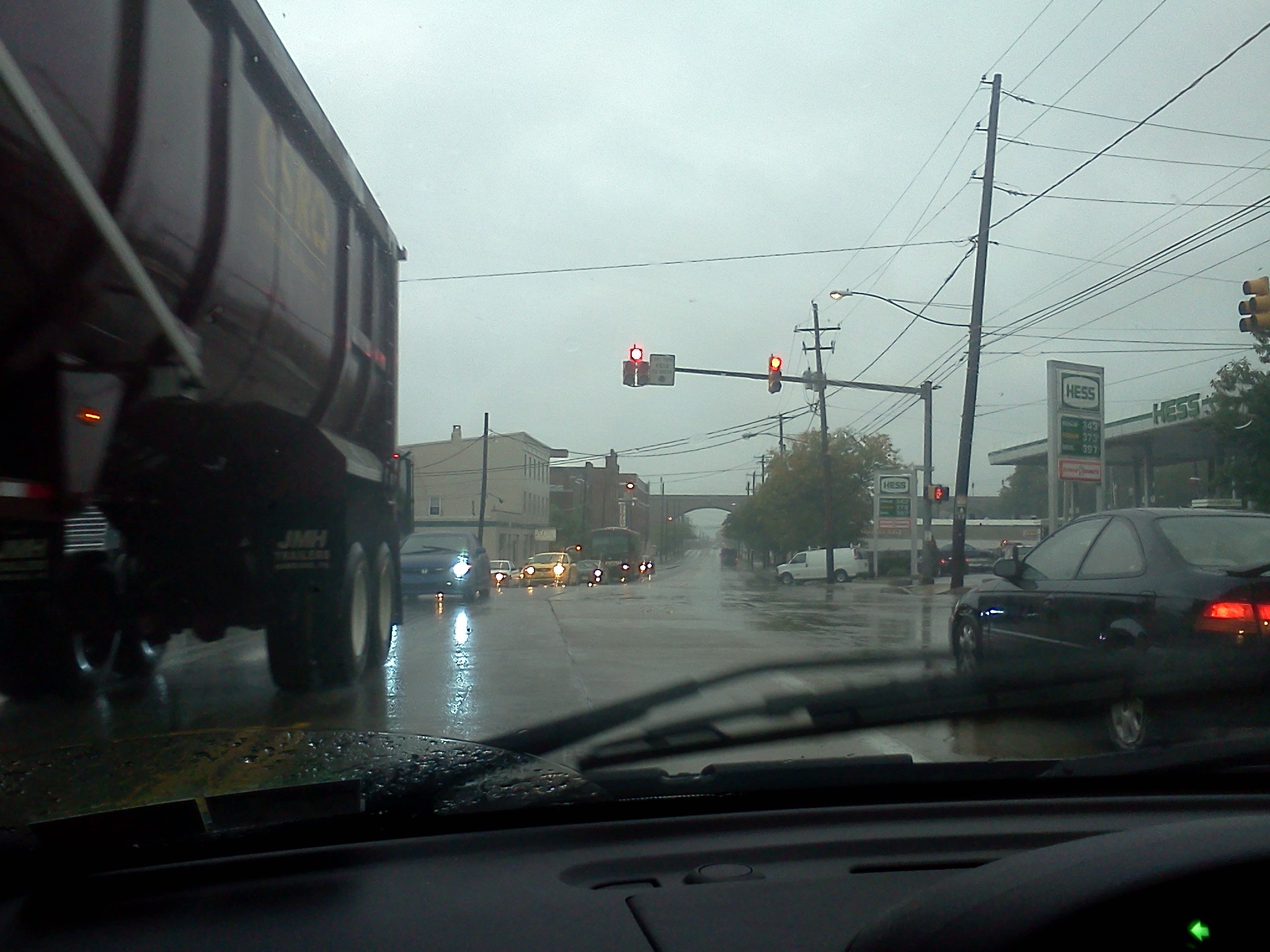Posts
Radio PA Roundtable 02.07.13
/in Audio, Media, News, Radio PA Roundtable /by PAMattersThis week, on a special edition of Radio PA Roundtable, Brad Christman & Matt Paul break down key portions of Governor Tom Corbett’s budget address, including plans for education, pension reform and road & bridge funding.
Radio PA Roundtable is a 30-minute program featuring in-depth reporting on the top news stories of the week.
Click the audio player below to hear the full broadcast:
[audio:https://s3.amazonaws.com/witfaudio/radiopa/Roundtable02-08-13.mp3]Opinions Shift on Same-Sex Marriage
/in News /by PAMattersPublic opinion is changing when it comes to same-sex marriage in Pennsylvania. Today’s Franklin & Marshall College Poll finds that 52% of Pennsylvania voters now favor legal marriage for gay and lesbian couples, compared to 41% who oppose it.
Poll Director Terry Madonna believes this is the first poll to show majority support for the issue in PA. “Some polls gave gotten up to 47, 49, even 50% support – depending on how the question was worded – but not a majority support for gay marriage,” Madonna tells Radio PA, “heavily driven by young voters whose attitudes on gay marriage are very different from seniors who oppose gay marriage.”
Just seven years ago, in May 2006, Madonna’s poll found just 33% support for same-sex marriage in the Keystone State.
Democratic state Senator Daylin Leach (D-Montgomery) has long been pushing marriage equality legislation, and is already circulating a co-sponsorship memo this session, which would legalize same-sex marriage in Pennsylvania. However, while public opinion may be changing, Madonna believes the Republican-controlled General Assembly is still many years away from changing state law.
The F&M Poll provides a number of compelling results aside from the same-sex marriage issue. Here’s a sampling:
– Governor Tom Corbett’s job performance rating has hit a new low, as just 26% indicate that he’s doing a “good” or “excellent” job.
– 64% oppose plans to put Pennsylvania Lottery operations in the hands of a private manager.
– 82% want more money being spent on transportation infrastructure, but only 47% support the main recommendations of the TFAC report.
– 53% support privatizing state-run liquor stores.
Governor Tom Corbett Proposes 2.4% Spending Increase for 2013-2014
/in News /by Brad ChristmanGovernor Tom Corbett has presented his general fund budget proposal for the 2013-2014 fiscal year that begins on July 1st. He calls it a balanced budget with no tax increases. Corbett’s plan calls for the state to spend $678.76 million more than it has in the current budget, an increase of 2.4%. In his budget address, the governor also laid out his plans for pension reform and transportation infrastructure.
Highlights of the budget include the first increase in basic education funding in two years. The 1.7% increase amounts to about $90 million. Additionally, the governor is proposing a block grant program to be funded by the state’s divestiture in the liquor business. That funding, which would total $1 billion over four years, could be earmarked for school safety, K-3 readiness and enhancing access to STEM programs (science, technology, engineering and mathematics), among other programs. The governor says there would be an initial $200 million available for the grants by the 2014-2015 school year.
Governor Corbett’s proposal also eliminates the Capital Stock & Franchise Tax on January 1, 2014, and calls for a reduction of the Corporate Net Income tax to 6.99% over ten years from 2015-2025. That CNI tax is currently 9.99%.
The budget plan also includes $14.7 million for three new State Police cadet classes.
On pension reform, the governor is proposing big changes for the two public pension funds that have been declared in a state of crisis. The State Employees Retirement System (SERS) and the Public School Employees Retirement System (PSERS) are both drastically underfunded and threaten to gobble up massive pieces of future state budgets. Among the changes proposed by Governor Corbett, new employees would be automatically enrolled in a 401(a) retirement plan where they will be required to contribute at least 6.25% of their salary (7.5% for PSERS). The governor says current employees would not see any changes to benefits already accrued and current retirees would see no changes at all in the benefits they are collecting. SERS is currently only 65.3% funded while PSERS is 69.1% funded.
On transportation funding, the governor is proposing removing a cap on the Oil Company Franchise Tax. Currently, distributors pay that tax based on the artificial cap of $1.25 per gallon, wholesale. Gas prices, of course, are well beyond that threshold, and the governor wants to “uncap” that price over a 5-year phase-in. Distributors would pay more in taxes under the plan, but to offset any potential attempts to pass along that increase to consumers, the governor also wants to lower the state tax on gasoline by a penny per gallon in 2013-14 and another cent in 2014-15. The current state gasoline tax is 12 cents per gallon.
Next up, the overall spending plan will be the subject of dozens of legislative budget hearings in the coming weeks. Then legislative leaders will carve out a final budget that will be sent to the floors of the House and Senate, probably in late June.
Environmental Groups Unveil Guidelines for Lawmakers
/in News /by PAMattersA coalition of five, statewide environmental groups has created a series of guidelines they want lawmakers to follow this session. “We’ve outlined five issues we think are likely to appear before the legislature in some fashion during the year, and wanted to give them an early opportunity to understand what it means to be in favor of the environment,” says Conservation Voters of PA Executive Director Josh McNeil. “Almost every public official will claim to be in support of protecting our environment. Now they know what that actually means when it comes to voting.”
The document is called the 2013 Environmental Guidelines for Pennsylvania Legislators.
For instance, with action likely on the state’s transportation funding crisis, McNeil stresses the need to include mass transit. “Public transportation provides incredible economic benefits and reduces significantly the pollution we put out as we move back-and-forth in life,” he says. “A single busload of passengers saves on carbon and global warming pollution from dozens of cars.”
Other issues addressed in the guidelines include: funding restorations for state environmental agencies and “green” standards for the state’s capital construction projects, among other things.
The other four groups to help craft the guidelines are Clean Water Action, PennEnvironment, PennFuture and the Sierra Club Pennsylvania Chapter.
They’ll all be watching this session’s legislative activity, and keeping constituents apprised of their lawmakers’ environmental voting record.
Scarnati Doesn’t Want Budget Hostages
/in News /by PAMattersAs the key issues on this spring’s legislative agenda become clearer, the Senate’s top Republican says now is not the time to start linking them together. “That’s Washington-style politics and we don’t need that,” Senate President Pro Tem Joe Scarnati (R-Jefferson) told reporters who huddled into his conference room at the state capitol.
Scarnati does not want to see the liquor privatization issue tied to transportation funding. “I think we’ve talked about it enough,” Scarnati said, discussing the urgency of improving the state’s transportation infrastructure. “We have a study, we have a report; we have everybody feeling the necessity to get this done. Delaying it and linking it just really doesn’t do any good for the commonwealth.”
His comments come as the Corbett administration has also been signaling that the pension reform issue will be tied to the state budget, specifically education funding. “The issue of cutting public education is a very sensitive issue… and putting an either-or doesn’t make this budget a lot easier to get done.”
Scarnati believes pensions should be addressed, and that the first step should be passing a bill that enrolls all newly-hired state workers in a 401(k)-style defined contribution retirement plan. “That’s the tourniquet that stops the bleeding, and that’s a move that we need to make,” he says.
But Scarnati does not know if the votes exist to reduce the future pension benefits of current state employees. He’s anxious to see the options that Governor Tom Corbett is expected to lay out along with his budget plan, and believes there’s a willingness to work toward a solution to the public pensions’ $41-billion dollar unfunded liability.
Corbett to Unveil Transportation Plan Soon
/in News /by PAMattersAs Governor Tom Corbett preps to unveil his transportation funding plan, House Democrats have already introduced a series of related bills. They reflect the recommendations of the Governor’s Transportation Funding Advisory Committee, which released its report in August 2011. Some of the funding streams it outlined as ways to help close the $3.5-billion dollar annual gap include: uncapping the oil company franchise tax and indexing vehicle & driver fees to inflation.
House Democratic Leader Frank Dermody (D-Allegheny) tells Radio PA that Pennsylvanians are willing to invest in their transportation infrastructure. “They’ll pay a little bit more knowing that it is going to improve roads and bridges and transit – make them safer – and put their families and neighbors to work again.”
Dermody says the governor needs to step up and lead on this issue, and lawmakers will get to work from there.
One lawmaker that’s been working behind the scenes with the Corbett administration for weeks is State Senator John Rafferty (R-Montgomery), chairman of the Transportation Committee. “The Senate will be very assertive this year in transportation funding,” Rafferty says, noting that he has legislation that’s almost ready to be introduced.
Meanwhile, Governor Corbett has publicly said he will introduce a transportation funding plan before his February 5th budget address, meaning some much anticipated news will be made within the next two weeks.
Senate Leader Discusses Accomplishments, Goals
/in News /by PAMattersWith the 2011-2012 legislative session set to expire at the end of the month, Radio PA’s Matt Paul took a look back at the past two years with state Senate Majority Leader Dominic Pileggi (R-Chester/Delaware) in a wide-ranging interview. Calling it an extremely productive session, Pileggi says jobs were the top legislative issue and the most important jobs bills are the ones that will have long-lasting effects.
“The continued phase out of the capital stock and franchise tax, in both the 11/12 & 12/13 [fiscal] years, we continued that phase out,” Pileggi says. “Just in this past year we eliminated the death tax on family farms. We’ve also updated the film tax credit program and actually added a new tax credit for historic buildings.”
Pileggi also cites Pennsylvania’s Fair Share Act and expanded Keystone Opportunity Zone program as important jobs bills from this past session.
Looking ahead to the 2013-2014 legislative session, Pileggi the biggest jobs issue is transportation funding. It would obviously provide short term jobs in the form of construction projects. “Longer-term I think every serious observer agrees that an effective transportation infrastructure – both for cars & trucks and mass transit – is necessary for a competitive environment for job creators,” Pileggi explains.
He also tells us the Senate will be ready to move forward with a package of bills to address the state’s pension crisis within the first six months of 2013.
Earlier this month, newly-elected and returning Republican senators tapped Pileggi for his fourth term as Senate GOP Leader.
A More Efficient PennDOT
/in News /by PAMattersThe state Department of Transportation is looking to streamline and modernize through a new initiative called PennDOT Next Generation. “We’re going to continue to look department-by-department to make sure we’re not spending the same dollar twice, and see if we can go across agency lines to reduce costs,” PennDOT Secretary Barr Schoch explained to the House and Senate Transportation Committees.
Schoch says four initial pilot projects will produce annual savings of $7-million. 30-current projects could save the state anywhere from $25 – $75-million a year.
Some of the projects already saving money include an electronic permitting system for Highway Occupancy Permits and a revised bridge inspection policy. Current projects are investigating more efficient use of winter materials and the regionalization of transit providers.
The administrative savings may be a drop in the bucket compared to the state’s $3.5-billion dollar annual transportation funding gap, but House Transportation Chair Rick Geist (R-Blair) tells reporters it’s important. “I think it’s wonderful when it comes to the bureaucratic inspection and self-inspection of how to do things better,” Geist explains.
Geist is calling for legislation to move all transportation functions under PennDOT and out of other agencies. “We have stuff that’s all over state government,” he explains.
Lawmakers will be receiving a summary report of PennDOT Next Generation at the end of the year, and it will include a series of legislative recommendations.
Lawmakers Hear Conflicting Views of Turnpike Finances
/in News /by PAMattersMembers of the House and Senate transportation committees got a crash course on Pennsylvania Turnpike finances this week. But it’s a good thing there was no pop quiz, because many of them were left with more questions than answers. “My head is spinning. Is there a crisis or isn’t there a crisis?” asked Rep. Mike McGeehan (D-Philadelphia), minority chairman of the House Transportation Committee.
Auditor General Jack Wagner urged the panel to repeal Act 44 of 2007. While the tolling of Interstate 80 never came to be, the transportation funding law still calls for the Turnpike Commission to make annual payments of $450-million to PennDOT. “The Turnpike Commission, with debt of $7-billion and growing, is clearly drowning in debt due to the burdens placed on it by Act 44.”
Wagner says Turnpike debt has increased 181% in the five years since the law was enacted. “This is all unacceptable because the Turnpike, quite frankly, isn’t going to survive if this continues,” Wagner testified.
But Turnpike officials are adamant there is no financial crisis. “We have a developed a sound, fiscally responsible approach to meeting all of our financial obligations, including the $450-million annual payments to PennDOT,” explained Turnpike Commission CEO Roger Nutt.
Wearing his hat as a member of the Pennsylvania Turnpike Commission, PennDOT Secretary Barry Schoch explained their annual debt service is only $35-million dollars a year, compared to the $450-million dollar fund transfer to the state. Over time, Schoch says, the revenue raised from annual toll increases will exceed the debt service, allowing the commission to pay down the debt.
After meeting for two hours, Senate Transportation Chair John Rafferty (R-Montgomery) announced that a second hearing will need to be scheduled. The one thing lawmakers and testifiers all seemed to agree on is that Pennsylvania must address its transportation funding crisis… with or without Act 44.
Welcome to PAMatters.com, a new source for news and commentary from Pennsylvania’s capital. In addition to video, audio and pictures from the stories and events that affect YOU, you’ll also get some behind-the-scenes analysis via blogs from our award-winning staff of journalists.












